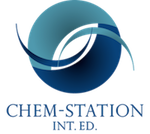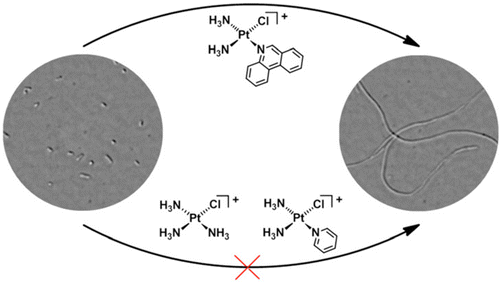Johnstone, T.C.; Alexander, S. M; Lin, W.; Lippard, S.J. J. Am. Chem. Soc. 2013, ASAP
DOI: 10.1021/ja411742c
The effect of the novel and potent monofunctional platinum(II) agent phenanthriplatin onEscherichia coli and bacteriophage λ lysogens is reported. E. coli filamentation was observed by light microscopy when cells were grown in the presence of phenanthriplatin, cis-[Pt(NH3)2(Am)Cl]+ where Am is phenanthridine. Treatment of lysogenic bacteria with this compound resulted in lysis and the production of viral particles, as indicated by plaque formation in a bacterial lawn. The results obtained with phenanthriplatin are contextualized by comparison with those obtained using cisplatin as well as other, less active, monofunctional compounds such as [Pt(NH3)3Cl]+ and cis-[Pt(NH3)2(py)Cl]+, where py is pyridine. The ability of phenanthriplatin to induce bacterial filamentation and initiate lysis in lysogenic bacteria corroborates the hypothesis that the biological activity of this complex is mediated by its interaction with DNA.
Prof. Stephen J. Lippard, whose research spans the fields of biological and inorganic chemistry, is the Arthur Amos Noyes Professor of Chemistry at the Massachusetts Institute of Technology. He is well known for his work on the mechanism of the anti-cancer drug cisplatin, which contains platinum and is primarily used to treat testicular cancer and ovarian cancer. His lab is currently working on designing more effective platinum anti-tumor agents. Cisplatin , carboplatin, and oxaliplatin are collectively used to treat approximately half of all cancer patients receiving chemotherapy. This paper described here reveal that the unprecedented potency of the monofunctional complex (phenanthriplatin) is manifest not only in mammalian cells, as previously reported,4 but also in bacterial cells.
- Related Links
Lippard Research Group
- Related Books
[amazonjs asin=”0470390433″ locale=”US” title=”Letters to a Young Chemist”][amazonjs asin=”0854841121″ locale=”US” title=”The Discovery, Use and Impact of Platinum Salts as Chemotherapy Agents for Cancer”]


